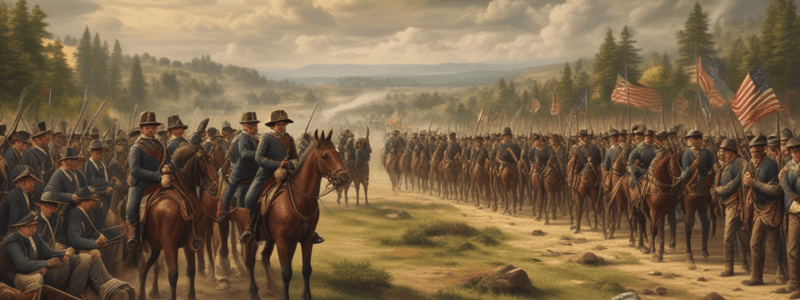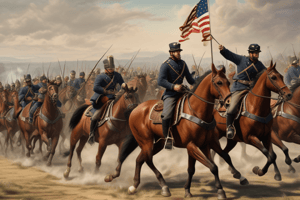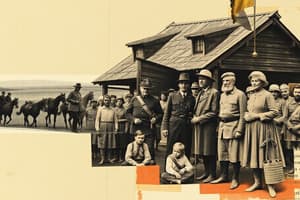Podcast
Questions and Answers
What was the dominant source of income in the South during the Civil War?
What was the dominant source of income in the South during the Civil War?
- Industrial production
- Finance
- Immigration
- Cotton (correct)
What percentage of the South's population lived in urban areas?
What percentage of the South's population lived in urban areas?
- 26%
- 20%
- 40%
- 10% (correct)
What was the impact of the war on the Southern economy?
What was the impact of the war on the Southern economy?
- It caused a strain on the economy due to the absence of men (correct)
- It led to a surge in immigration
- It had no significant impact
- It led to an increase in industrial production
What was a key factor in the North's economic superiority?
What was a key factor in the North's economic superiority?
What percentage of men of military age in the South fought in the war?
What percentage of men of military age in the South fought in the war?
What was one of the main reasons the South's economy collapsed during the Civil War?
What was one of the main reasons the South's economy collapsed during the Civil War?
What was the Richmond Bread Riots a response to?
What was the Richmond Bread Riots a response to?
What was one of the consequences of the conscription laws in the South?
What was one of the consequences of the conscription laws in the South?
What was the purpose of the Enrollment Act of 1863?
What was the purpose of the Enrollment Act of 1863?
What was the main occupation of the young men who resorted to guerrilla fighting during the Civil War?
What was the main occupation of the young men who resorted to guerrilla fighting during the Civil War?
What was the term used to describe opponents of the war in the North?
What was the term used to describe opponents of the war in the North?
What was the main impact of the devastation of the Civil War on the South?
What was the main impact of the devastation of the Civil War on the South?
What was Clara Barton's role during the Civil War?
What was Clara Barton's role during the Civil War?
What was the approximate cost of the war for both governments?
What was the approximate cost of the war for both governments?
What was the consequence of the loss of slaves for planters?
What was the consequence of the loss of slaves for planters?
Flashcards are hidden until you start studying
Study Notes
Economy During the Civil War
- The South's economy was based on agriculture, with cotton as the dominant source of income, and depended on the continuation of slavery.
- The North's economy was based on industry and finance, with a larger population, more urban areas, and more resources.
Impact of the Civil War on the Southern Economy
- The war put a strain on the Southern economy, with 75% of men aged 18-45 fighting in the war, leaving women to run farms, businesses, and oversee the large slave population.
- The Union blockades of Southern ports hindered the South's ability to export and import goods, leading to economic collapse.
- Hyperinflation, scarcity of food, and protests (e.g., Richmond Bread Riots) worsened the situation.
Impact of the Civil War on the Northern Economy
- The war stimulated economic growth in the North, with the emergence of new industries, such as weapons, leather goods, and textiles.
- Federal laws, including land grants, railroad construction, and banking regulations, boosted the economy.
- The North's economy did not suffer greatly from the war.
Conscription Laws and Their Effects
- Conscription laws in the South and North were unpopular, with exemptions for certain groups, leading to resentment among poor whites and the general population.
Civil War Effects on Communities
- Many people in the North opposed the war, believing it to be unjustified and unconstitutional.
- Guerrilla fighting occurred in Missouri, and bushwhackers, including Jesse James, emerged.
- The war devastated entire communities, wiping out industry, agriculture, and business in the South.
Women in the Civil War
- Women played a crucial role in the war effort, taking on new occupations and responsibilities.
- Clara Barton, known as the Angel of the Battlefield, nursed the dying and later founded the American Red Cross.
- Frances Clayton fought in the war dressed as a man, participating in 17 battles.
Consequences of the Civil War
- The war was expensive, with over 750,000 soldiers dying and a total cost estimated at over $3.3 billion.
- The war led to widespread destruction, social upheaval, and a long-term cycle of poverty in the South.
- The North experienced economic prosperity, agricultural development, and population growth.
Studying That Suits You
Use AI to generate personalized quizzes and flashcards to suit your learning preferences.




